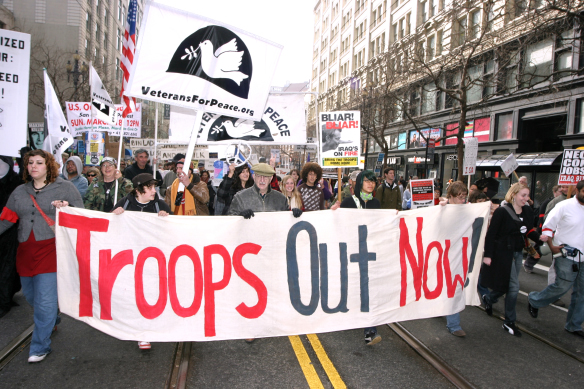 Today is International Women’s Day. Palestinian refugee Fatima Helou celebrates the women resisting occupation today. This article was first published on International Women's Day 2005.
Today is International Women’s Day. Palestinian refugee Fatima Helou celebrates the women resisting occupation today. This article was first published on International Women's Day 2005.Amnesty International has just published a disturbing report on the plight of women in Iraq. The report reveals how sanctions, war and occupation have wiped out years of advances made by Iraqi women. Two years of war and occupation have driven women into the home, seen their jobs disappear and their rights eroded.
It is an indictment of the world today that this report should be published on the eve of International Women’s Day, a day that should see women celebrating everywhere.
Even though there seems little to cheer about, International Women’s Day touches women all over the world. This year we should dedicate this day to the women of Iraq and Palestine.
Since we lost our homeland in 1948 Palestinian women have taken part in the struggle as sisters, wives and mothers. We have fought occupation and oppression hand-in-hand with men.
Women sold their jewellery to buy weapons, faced imprisonment for their dissent, defied humiliation and took up arms for their liberation. Many have embraced death for our freedom.
I would like to dedicate this day to the memory of a young woman, barely in her twenties, who took up arms in 1978 to fight for the liberation of Palestine.
Dalal al-Mugrabi was killed on the orders of Ehud Barak, later a prime minister of Israel. She had just led a commando raid in Israel. The punishment for her resistance continued after her death, as the Israeli troops refused to bury her body. She has become a symbol for all Palestinian women.
On this day I remember the women of Shatilla refugee camp in Lebanon where I was born, and where I lived under siege as a teenager in the mid 1980s.
I had survived the Sabra and Chatilla massacre during the Israeli invasion of 1982. But four years later, we found ourselves once again fighting for our very survival.
We were in the midst of a siege by a Lebanese militia force. Our food was running out and water was becoming scarce. Nevertheless, the young women in the camp gathered to mark International Women’s Day.
It was the first time I had heard about such a celebration. We were given a carton of juice—a luxury during the siege—and the women made speeches calling for equality and freedom.
Women, we were told, had to be at the centre of the struggle for our own liberation, and on this day millions of women around the world were also fighting for their survival—whether under occupation, against war, poverty or for their basic rights.
I, and many of my sisters, felt for the first time that we were part of a global struggle. That night in 1986 brought us hope because we no longer felt isolated and abandoned.
I would like to dedicate this day to the women living under occupation today—the thousands of women in Palestine and Iraq who find themselves at the head of families. Women who have to step into the shoes of men to carry on the struggle for survival. Women who, through war, find themselves becoming both mother and father. Women who have to find food to feed their families as their husbands, sons and brothers rot in prison, or are killed or maimed.
On this day we should remember how small acts of defiance are important, such as the defiance shown by two schoolgirls from Hebron who resisted attempts by Israeli soldiers to humiliate them. They suffered beatings and imprisonment at a military checkpoint after they refused an order to undress in front of the soldiers.
I would also like to dedicate this day to the thousands of women across the world who show their solidarity, and through their campaigns and small deeds have broken the isolation many of us feel.
Most of all I would like to dedicate International Women’s Day to the millions of women around the world whose daily battle against all odds keeps our hope for a better future alive.
Fatima Helou is a Palestinian refugee living in Scotland. She was seriously wounded in an Israeli airstrike during the invasion of Lebanon in 1982. She survived the Sabra and Shatilla massacre that year and the War of the Camps in 1986. Fatima fled Lebanon after an attempt on her life for her campaign to indict Ariel Sharon and Lebanese warlords for their role in the massacre. She is currently facing deportation back to Lebanon under New Labour’s asylum laws.
Saturday 15 March will see a demonstration in London to mark the 5th anniversary of the invasion of Iraq - coaches will be going from Cardiff. Email - cardiff_troopsout@hotmail.com for more information.















No comments:
Post a Comment